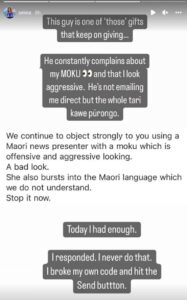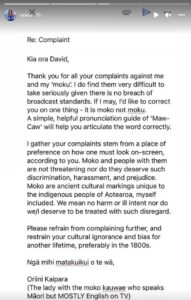A television host adorned with a traditional Maori facial tattoo has gracefully addressed negative feedback from a viewer, reaffirming her pride in her cultural heritage and personal identity.
Online debates frequently emerge regarding facial tattoos, with some arguing for their restriction to the body, while others appreciate their cultural significance.
At 41 years old, Oriini Kaipara, a trailblazing presenter, made history by becoming the first primetime news anchor with a moko kauae, a revered cultural symbol worn by Maori women.
The Maori people, the original Polynesian inhabitants of mainland New Zealand, view moko kauae as potent representations of their heritage and individuality. Traditionally inked on the lips and chins, these facial tattoos signify a woman’s familial connections, her leadership role in the community, and acknowledge her lineage, status, and capabilities.

However, amidst the praise, one viewer, identified as David, expressed dissatisfaction with Kaipara’s moko kauae in an email to Newshub.
“We continue to strongly object to you employing a Maori newsreader with a moko which is offensive and aggressive looking,” he wrote, according to the Daily Mail. “A poor representation. She also switches to the Maori language which we do not understand. Cease it immediately.”
Undeterred by David’s critical remarks, Kaipara bravely tackled the issue head-on, sharing screenshots of the messages on her Instagram story and responding with poise and dignity.
“Today I reached my limit. I responded. It’s not my usual practice. I broke my own rule and hit send,” she wrote on an Instagram story alongside a screenshot of David’s message.
Kaipara also shared her email response to David, in which she explained that she could not take his complaint seriously “as there is no violation of broadcast standards.”
She also corrected his spelling of moko, as David had erroneously referred to hers as “moku.”
In her email, Kaipara continued: “I understand your complaints arise from your personal preferences regarding on-screen appearance. Moko and those who wear them are not intimidating, nor do they deserve discrimination, harassment, or prejudice.
“We harbor no malice or ill intent, and we/I do not deserve to be treated with such disrespect,” she added. “Please refrain from further complaints, and set aside your cultural ignorance and bias, ideally in a bygone era, preferably the 1800s.”

Despite David’s harsh critique, Kaipara emphasized that she primarily receives words of admiration, and encounters with unkind trolls are infrequent.
In an interview with the New Zealand Herald shortly after addressing David’s complaint, Kaipara underscored the importance of having more Maori advocates: “The fact that my mere presence bothers some people underscores why we need more Maori advocates in significant roles across all sectors.”

In summary, Kaipara’s composed response serves as a compelling reminder of the significance of cultural pride and resilience in the face of adversity – inspiring others to embrace their identities unabashedly and challenge discriminatory attitudes.
Feel free to share this article with your circle!






